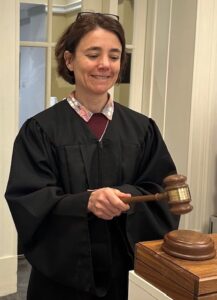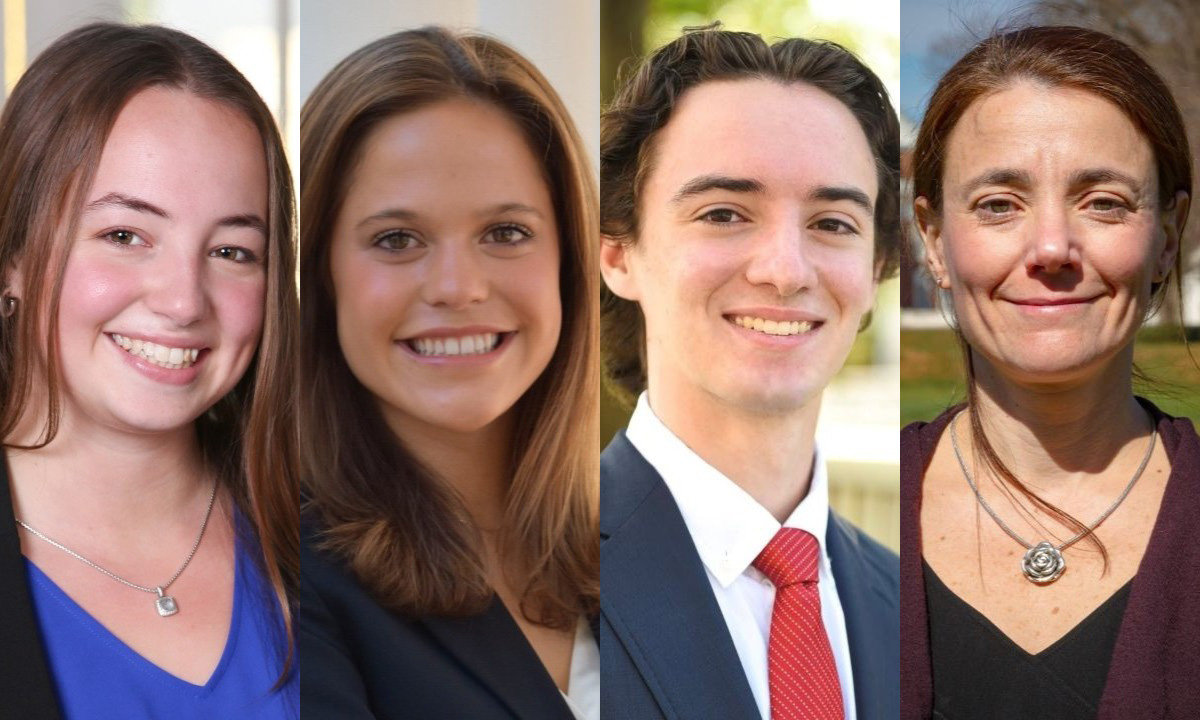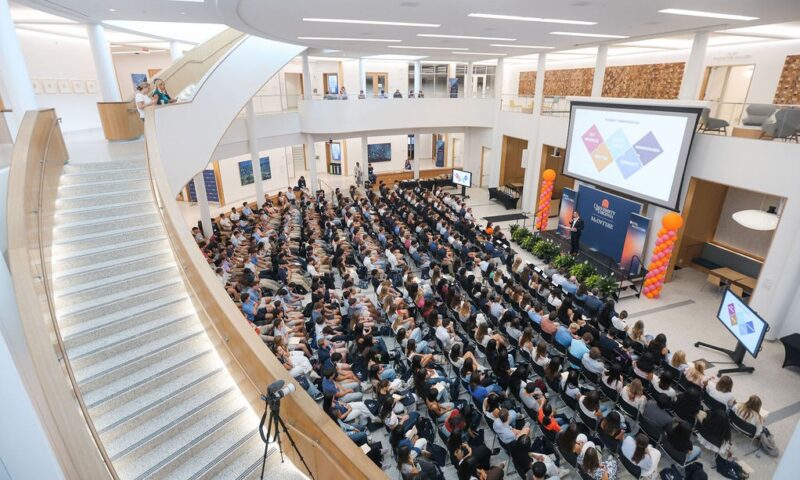The company may be going bankrupt. The parties involved, debt holders and equity holding management, need to come to an agreement. But the clock’s ticking. The negotiations can’t go on forever.
Almost as soon as more valuations and division of funds proposals are offered, they’re quickly turned down for being too little—or too much. Or the equity holders are getting more than they should. Or not nearly enough.
The bankruptcy judge threatens liquidation. The pressure is high, and so are emotions.
Luckily, it’s a simulation in McIntire Professor Carola Schenone’s Advanced Corporate Finance course.
Blending rigorous academic theory with practical application, Schenone’s class stands out. Her students laud her approach, which combines her academic expertise with engaging storytelling, helping to transform intricate financial concepts into memorable lessons.
She structures Advanced Corporate Finance around case studies, but one otherwise less important case concerning a small chain of convenience stores suddenly takes on much greater meaning when it’s teased to students on the syllabus as only “Mystery Case.” Why? Because Schenone uses it as an opportunity to teach about bringing a company out of Chapter 11 bankruptcy by mirroring the diverse interests of claimants through a role-playing activity. By taking on the negotiation and strategizing themselves, students see the difficulties in steering a distressed company back to stability while acquiring invaluable professional skills.
“There’s a firm that’s going bankrupt, and the students are assigned to value it,” Schenone explains. “Each student group has a stake in the firm, and they then have to defend their position.”
 Students are grouped into teams representing the different claimants—senior debt, junior debt, and management (equity holders). Each team drafts a reorganization plan, balancing valuation techniques and strategic negotiations, in order to win approval from other claimant groups or face the specter of liquidation. Schenone acts as the bankruptcy judge overseeing the process.
Students are grouped into teams representing the different claimants—senior debt, junior debt, and management (equity holders). Each team drafts a reorganization plan, balancing valuation techniques and strategic negotiations, in order to win approval from other claimant groups or face the specter of liquidation. Schenone acts as the bankruptcy judge overseeing the process.
In Schenone’s experience, students acting as senior creditors usually offer a smaller, more realistic value of the firm than those put forth by junior creditors, with the latter group seeking a greater valuation in hopes of getting something in the deal. “They want a bigger pie, so they come up with an exaggerated value,” she notes. Lastly, management holds equity but has the smallest chance of receiving anything unless the firm happens to be particularly large. What ensues is an exciting—and often highly charged—give-and-take between the groups, as they debate the ideas presented.
“Students have to come up with a plan to reorganize the firm, giving them a more realistic view of how bankruptcy proceedings actually work in court. They get to live through it. And if they don’t come to an agreement at the end of class, the firm then is declared bankrupt, and everybody loses,” says Schenone.
To heighten the drama of the class activity, Schenone wears her black graduation gown to play the part of the bankruptcy court judge and even borrows a gavel for the occasion.
Navigating Nuance, Negotiation, and Presentation
Alex Viar (McIntire ’25), a Commerce and Computer Science double major, thinks the role-playing activity was profoundly eye-opening.
“What I found intriguing was observing how diverse the incentives were for equity versus debt holders,” he observes. The exercise in strategic negotiation also underscored a critical real-world lesson for him: “There’s really no right answer.”
Although Viar’s group faced rejections, he learned more about the art of recalibrating proposals to make them more competitive as the possibility of liquidation loomed closer. “It was all about negotiating skills and who’s going to make the most of that surplus,” Viar notes about the unfolding dynamic.
Viar also appreciated the format of the class. “The simulation of the process made it much more memorable for me,” he says. The endeavor doubled as a practical presentation exercise, embracing unpredictability and questions from peers and the professor alike. Dealing with those unknown factors supports Viar’s long-term professional confidence, equipping him with a mindset adaptable to future corporate finance challenges.
For Zoe Mendoza (McIntire ’25), a Commerce and Math double-major heading into investment banking with Santander, the class sharpened her negotiation skills. Recognizing the double-edged sword of valuation and distribution, she points out how “a lot of the groups that had a higher valuation did a lot better in the voting afterwards because people liked how they were getting more money”; she quickly came to realize during the presentation that her own team made a misstep by proposing an overly conservative terminal growth rate.
Mendoza says that Schenone’s activity added vibrancy to the class and an energy that proved infectious. “She was really excited, which made us more excited about it,” Mendoza adds, finding that Schenone’s balanced guidance instilled teams with better learning resilience and an enhanced ability to build on perceived failures as opportunities for growth.
Embracing Complex Concepts for the Future
Martha Reavis (McIntire ’25), who will be joining the consumer division at investment bank Stephens in New York after graduation, found the interplay between finance theories and their real-world applications particularly actionable.
The scenarios enacted in class echoed throughout her coursework and professional journey, empowering her as an informed and confident finance practitioner. Reavis observed that despite being part of the junior debt team, her group’s proposal garnered popular support. The moment taught Reavis the value of strategic equity and debt balancing: “We were fair to the senior debt holders, the equity, and weren’t too greedy for ourselves.”
Reavis says that the interactive aspect of the activity is what made it fun. “There was a lot of laughter,” she recalls. “We learned a lot, but also it was a low-stakes environment. That made it more valuable because we could take risks in our presentations, and maybe say something that we hoped was right.”
Schenone gave ample support before and throughout the activity, recalls Reavis, having been supplied with “a technical foundation and also valuation methods”; indeed, she shares that her professor’s guidance during the entire course proved impactful: “She validated where we were and how knowledgeable we were.” That support went beyond course assessments, supplying Reavis with confidence, and preparing her for real-world negotiations and financial strategizing.
“Schenone did a great job of teaching and fostering an inclusive, safe learning environment where we could take risks like we did in this project,” Reavis says. “I learned a lot in her class, and I think my confidence as a Finance concentrator grew from her course, which has a lot to do with her personality and teaching style.”
Schenone’s Advanced Corporate Finance course is helping to shape adept, adaptable business leaders like Viar, Mendoza, and Reavis who have benefited from the intelligently structured experiences. Through Schenone’s guidance, students are learning to solve financial puzzles, absorbing the essence of value optimization in business, and exemplifying how thoughtful academic education can provide a robust foundation that fuels professional success.



